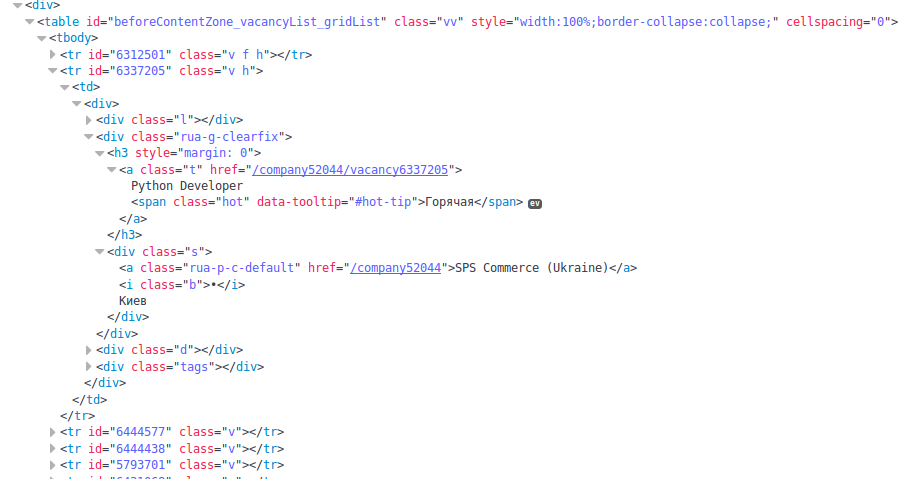A couple of suggestions:
- Use
requests instead of urllib. This is mostly a matter of preference but I think you'll find it easier to work with.
An example on how this would look is:
import requests
page = requests.get('http://rabota.ua/zapros/python/%D0%BA%D0%B8%D0%B5%D0%B2').content
- Fix the bug
In some cases you'll get:
Traceback (most recent call last):
http://rabota.ua/company209907/vacancy6312501
vacancies[x]['link'])) UnicodeEncodeError: 'ascii' codec can't encode characters in position 26-33: ordinal not in range(128)
Which means you're trying to parse characters which cannot be decoded as they are. I'd recommend using the encode function to get rid of it:
for x in vacancies:
print('{}\n{}\n{}\n'.format(
vacancies[x]['company'].encode('ascii', 'ignore'),
vacancies[x]['position'].encode('ascii', 'ignore'),
vacancies[x]['link'].encode('ascii', 'ignore')))
Instead of using a counter, you could use the builtin that Python already has: enumerate().
This:
inx = 0
for x in a:
inx += 1
vacancies[inx].update({'company': x.get_text()})
Will become:
for counter, x in enumerate(a, 1):
vacancies[counter].update({'company': x.get_text()})
So far, we have this:
from bs4 import BeautifulSoup
import requests
page = requests.get('http://rabota.ua/zapros/python/%D0%BA%D0%B8%D0%B5%D0%B2').content
soup = BeautifulSoup(page, "lxml")
a = soup.find_all("a", class_="t")
vacancies = {}
for counter, x in enumerate(a, 1):
vacancies[counter] = {
'position': x.contents[0].strip(),
'link': 'http://rabota.ua{}'.format(x.get('href'))
}
a = soup.find_all("a", class_="rua-p-c-default")[2:]
for counter, x in enumerate(a, 1):
vacancies[counter].update({'company': x.get_text()})
for x in vacancies:
print('{}\n{}\n{}\n'.format(
vacancies[x]['company'].encode('ascii', 'ignore'),
vacancies[x]['position'].encode('ascii', 'ignore'),
vacancies[x]['link'].encode('ascii', 'ignore')))
Other suggestions:
I'm not a fan of your naming conventions:
a might become href_tagx might become element
More, I'd split everything into functions as this will make your code readable and easier to maintain:
from bs4 import BeautifulSoup
import requests
URL = 'http://rabota.ua/zapros/python/%D0%BA%D0%B8%D0%B5%D0%B2'
def get_html():
return BeautifulSoup(requests.get(URL).content, 'lxml')
def parse_html():
content = get_html()
href_tag = content.find_all('a', class_='t')
vacancies = {}
for counter, element in enumerate(href_tag, 1):
vacancies[counter] = {
'position': element.contents[0].strip(),
'link': 'http://rabota.ua{}'.format(element.get('href'))
}
href_tag = content.find_all("a", class_="rua-p-c-default")[2:]
for counter, element in enumerate(href_tag, 1):
vacancies[counter].update({'company': element.get_text()})
for element in vacancies:
print('{}\n{}\n{}\n'.format(
vacancies[element]['company'].encode('ascii', 'ignore'),
vacancies[element]['position'].encode('ascii', 'ignore'),
vacancies[element]['link'].encode('ascii', 'ignore'))
)
if __name__ == '__main__':
parse_html()
Yet another way of splitting the logic of your program:
from bs4 import BeautifulSoup
import requests
URL = 'http://rabota.ua/zapros/python/%D0%BA%D0%B8%D0%B5%D0%B2'
def get_html():
return BeautifulSoup(requests.get(URL).content, 'lxml')
def get_position_and_link(content):
href_tag = content.find_all('a', class_='t')
vacancies = {}
for counter, element in enumerate(href_tag, 1):
vacancies[counter] = {
'position': element.contents[0].strip(),
'link': 'http://rabota.ua{}'.format(element.get('href'))
}
return vacancies
def update_info(content):
company_href_tag = content.find_all("a", class_="rua-p-c-default")[2:]
vacancies = get_position_and_link(content)
for counter, element in enumerate(company_href_tag, 1):
vacancies[counter].update({'company': element.get_text()})
return vacancies
def main():
content = get_html()
vacancies = update_info(content)
for element in vacancies:
print('{}\n{}\n{}\n'.format(
vacancies[element]['company'].encode('ascii', 'ignore'),
vacancies[element]['position'].encode('ascii', 'ignore'),
vacancies[element]['link'].encode('ascii', 'ignore'))
)
if __name__ == '__main__':
main()
You can see that I also added if __name__ == '__main__'. By doing the main check, you can have that code only execute when you want to run the module as a program and not have it execute when someone just wants to import your module and call your functions themselves.
As @Mathias suggested in comments, instead of using the encode() function, you might as well do:
def main():
content = get_html()
vacancies = update_info(content)
for element in vacancies:
for info in ('company', 'position', 'link'):
print(vacancies[element][info])
print('\n')
The advantage of this method might appear when you have a lot of unrecognised ascii characters which, with the first version, may lead to something like: .,..

